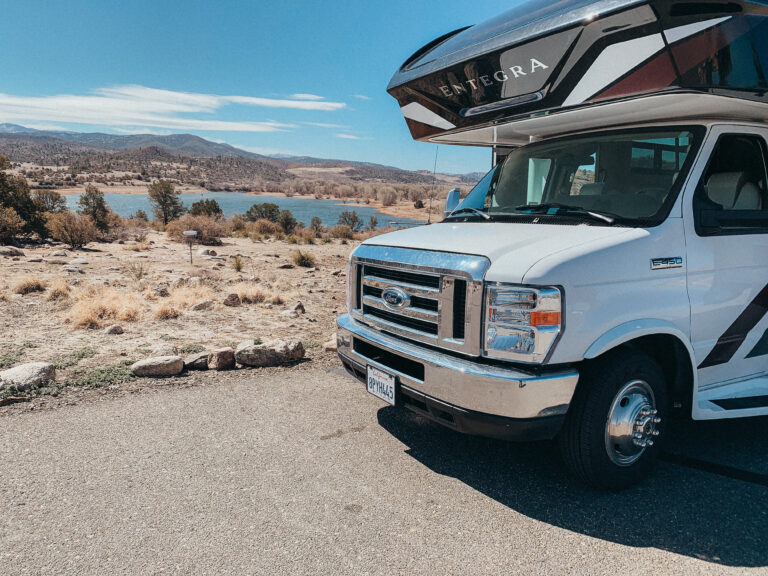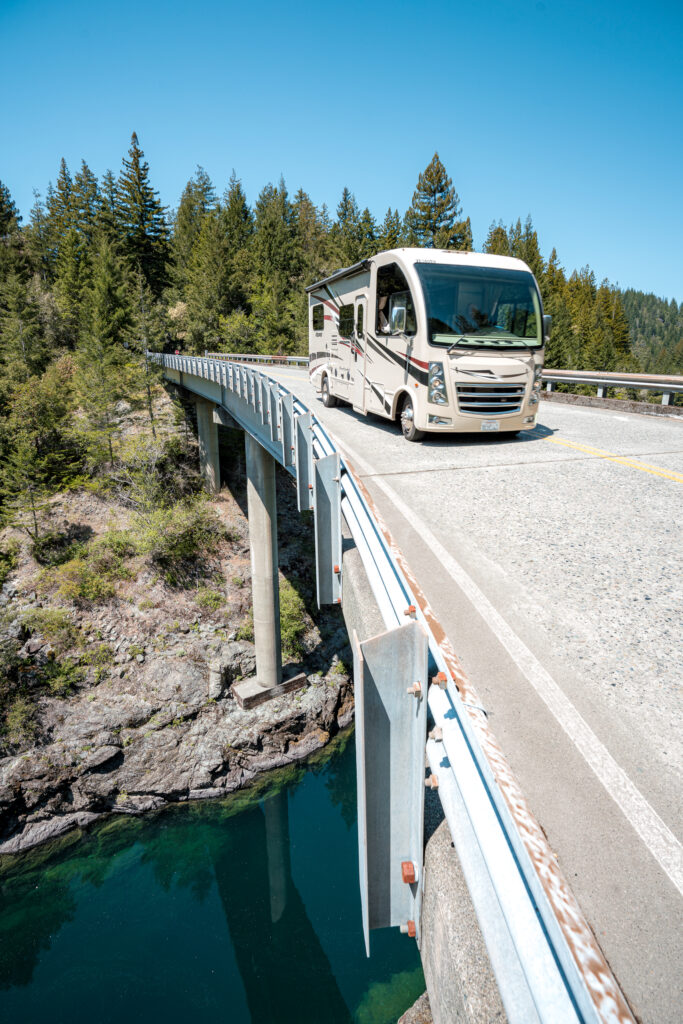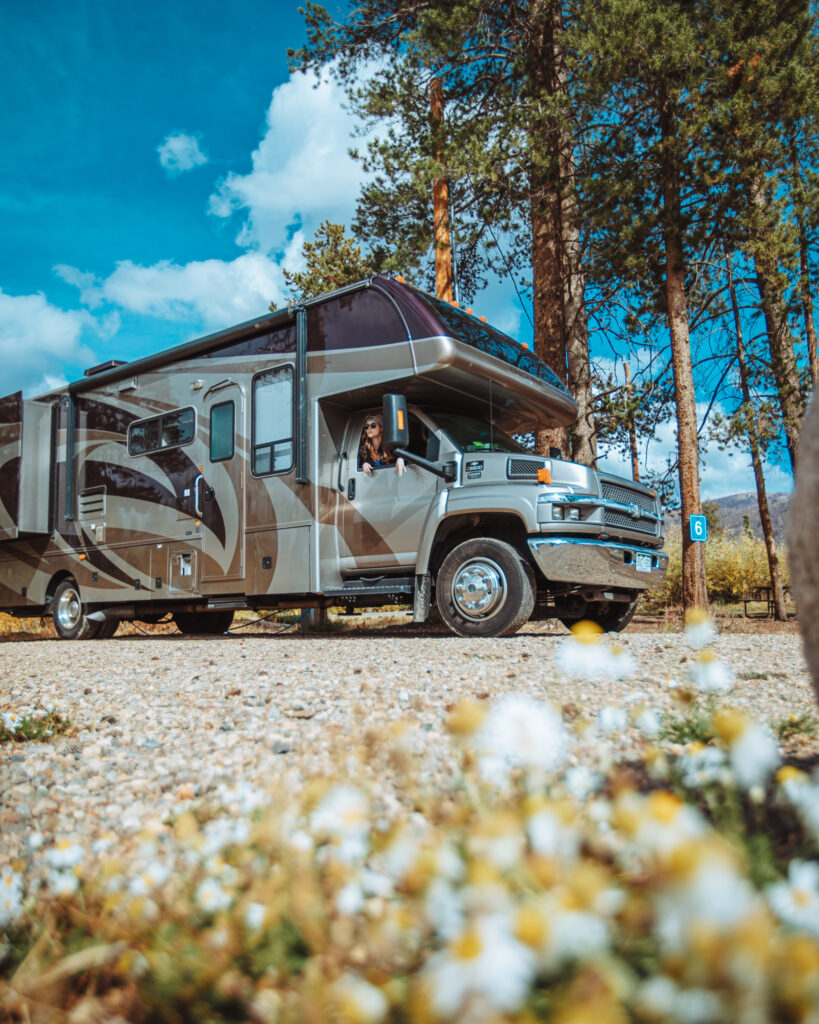
It’s hard to think of a component of your RV that’s more critical than your tires. After all, you literally ride on them — they’re essential to your trip, not to mention your safety!
But despite their importance, a lot of us are surprisingly unfamiliar with the ins and outs of RV tires specifically. What’s the difference between RV tires and regular old truck tires, anyway? Should RV tires be rotated? How often should RV tires be replaced?
When it comes to your motorhome or trailer tires, you don’t want to be uninformed. And you also probably want to know how to take care of them to ensure they last as long as possible. After all, one thing you probably do know about tires of all sorts is that they’re definitely not cheap!
(Psst: looking for a way to stretch your travel budget? Don’t forget about our favorite discount camping club, Passport America. For less than $50 per year, your membership will get you access to premium sites at almost 1900 campgrounds nationwide… at a 50% discount!)
But fortunately, taking good care of your tires doesn’t have to be complicated, and the tools you need — like an accurate RV tire gauge or valve extenders — are way more affordable than a new set.
Here’s what you need to know about your RV’s big ol’ rubber feet.

What’s the Difference Between RV Tires and Truck Tires?
First things first: What makes your RV’s tires special?
Well, depending on the make and model of your rig, maybe nothing. On lighter travel trailers and even some fifth wheels, RV tires and good quality truck tires can be interchangeable, especially since truck tires come in so many different grades, types, and options.
One thing some RV-specific tires incorporate is better UV resistance since they’re almost never shielded by the shelter of a garage. The most important thing is always to ensure your tires are rated for the total weight of your trailer and that they’re of good quality so you can count on their safety and performance.
Average Life of RV Tires
Since motorhomes aren’t generally used as often as around-town personal vehicles, it’s a little harder to estimate their average lifespans or maintenance schedules. For instance, some people only use their RVs once a year, which obviously puts far less wear and tear on their tires than they’d get if they were, say, full-timers. (But if your rig is sitting empty for long stretches… well, why not list it on RVshare?)
However, it’s still important to keep up with RV tire maintenance, just as you would in your car or SUV, such as regular rotations, checking pressure, and inspecting for cracks and dry rot.
The ideal air pressure in RV tires varies widely depending on the individual type and model of RV you drive, so be sure to check your user manual for details. However, one thing’s for sure: you should invest in your very own pressure gauge so you can keep tabs on it! These days, even a high-tech digital gauge is available for less than $15. If you’re having trouble accessing the valve system, valve extenders can come in really handy — and are also only $20 or so.
If you find your RV tires have low air pressure, you can adjust it with an air compressor for RV tires, like this one available on Amazon for about $50. However, it’s very important that you don’t over-inflate your tires, either — too much pressure can cause rapid wear, not to mention increase your risk of a highway blowout!

How Long Should RV Tires Last?
The age of RV tires doesn’t matter as much as how they’re holding up physically, so you should always make sure to inspect them for visual signs of wear before you head to your next destination. You also want to be sure you aren’t overloading your RV’s weight limit capacity, as tires have different weight and distribution limits that must be observed for safe driving.
Want to know one of the best ways to extend your RV tires’ lifespan? Keep them covered when in storage. That UV light we talked about above can be a huge part of the deterioration process — so slow it down whenever you can! You can find a set of four canvas wheel covers for less than $30… which is a fraction of the price it costs to replace even one worn-out tire.
Replacing RV Tires
Even the best-maintained RV tires will eventually wear down and need to be replaced. Since your rig is an extremely large and heavy vehicle that needs to maintain a delicate tire balance, it’s a good idea to have a professional do this for you — but if you want to see a tutorial on how to do it yourself, check out this video on YouTube by the Wandering Wagners. Always make sure to check your user manual before performing any serious maintenance work, and ensure that you have the right tools for the job before you get started!
If you’re not sure where your tires stand, a good rule of thumb is to replace them every six years or so. And if you’ve been driving around on a tire that’s constantly losing air pressure or shows visual signs of wear and tear, it might be a good candidate for replacement, too.
Sometimes, you may find you can perform a minor tire repair on your own, so long as you have a quality tire repair kit on board — but it’s always a good idea to have those tires inspected by a professional at your earliest convenience. After all, a replacement might be costly… but it’s a much better deal than risking your life driving down the highway on a bad piece of rubber.
In a motorhome or travel trailer, your tires are your foundation; even if everything’s in good working order up top, you’re not going anywhere without a quality set on the road! So make sure you take the necessary steps to maintain, inspect, and replace your tires as necessary. Doing so will help ensure you enjoy many safe, happy camping trips to come.
This post may contain affiliate links.






